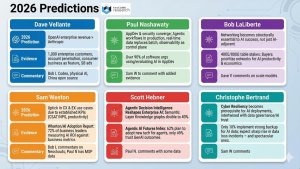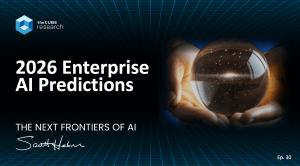ABSTRACT: As enterprises accelerate adoption of AI, securing the infrastructure that powers it has become a mission-critical priority. Dell Technologies is leading the charge with AI-ready solutions that unify compute, storage, and cyber-resilient, featuring PowerProtect, anomaly detection, and zero trust architectures. This brief explores how Dell helps organizations reduce risk, simplify recovery, and confidently scale AI workloads across hybrid environments.
Enabling the AI Era – Dell’s Infrastructure Blueprint for the Future
Across industries, a fundamental shift is underway. The rise of generative AI and machine learning has ushered in a new phase of digital transformation that demands more innovative algorithms and a wholesale rethinking of how data is stored, accessed, and turned into business value. Organizations today are confronting a powerful reality: AI will only be as effective as the infrastructure and processes that support it.
Gone are the days when data centers were viewed as mere cost centers. In today’s AI-driven landscape, they are becoming the nerve centers of innovation. From the edge to the cloud to on-prem environments, data is no longer static—it’s in motion, fueling intelligent applications, decision-making engines, and real-time digital twins of businesses. But enabling this transformation means more than deploying GPUs or buying the latest servers. It requires a holistic approach to data visibility, access, security, and operational modernization.
Dell Technologies is meeting this moment head-on. As enterprises navigate the complexity of AI adoption, Dell is providing the essential building blocks—high-density, power-efficient compute, scalable storage, and integrated networking—all designed from the ground up to support AI workloads. With a strategic focus on unifying infrastructure, standardizing operations, and ensuring AI readiness across the stack, Dell is helping customers move from AI exploration to enterprise-scale execution.
This series of analyst briefs will explore how Dell is equipping organizations to succeed in the AI era. They will cover the evolving demands on data centers, the critical role of on-prem data, real-world use cases driving ROI, and how Dell’s infrastructure and approach are reshaping what’s possible with AI.
The Evolving Threat Landscape and the Urgent Need for Resilience
As enterprises rush to adopt generative AI, they face a paradox: innovation is accelerating, but so are the associated risks. Data is the critical fuel for training large language models and AI agents, but it’s also the prime target for cyberattacks. Cybercriminals are employing AI themselves, increasing the speed, frequency, and sophistication of threats. Traditional perimeter-based security models are no longer sufficient, as attack surfaces expand across hybrid environments and insider threats become increasingly prevalent. Backup environments, long seen as the last line of defense, are increasingly under siege. Meanwhile, organizations are contending with skill shortages, fragmented toolchains, rising regulatory pressure, such as DORA, and the growing need to demonstrate compliance and cyber hygiene in real-time.
Against this backdrop, the business mandate encompasses more than just cybersecurity. It’s about cyber resilience. Enterprises must ensure not only that attacks are detected and contained swiftly, but also that they can recover rapidly with confidence in the integrity of their data, as threats shift from “if” to “when.” Consequently, cyber resilience must become a strategic pillar of AI-ready infrastructure.
How Dell Is Addressing These Challenges
Dell Technologies is tackling the modern cyber resilience mandates through a comprehensive, defense-in-depth approach centered on its PowerProtect portfolio. The foundation lies in a three-pillar strategy: reducing the attack surface, detecting and responding to threats, and recovering with clean, trusted data. PowerProtect integrates secure-by-design hardware, such as Data Domain, with intelligent software, such as Data Manager, and cyber recovery vaults, while embracing Zero Trust principles throughout.
To reduce the attack surface, Dell hardens its infrastructure with features like multifactor and multi-user authentication, immutable backup architectures, and anomaly detection. Dell’s implementation of CyberSense in cyber recovery vaults delivers 99.99% detection precision. Data Domain continues to be the foundation for cyber resilience. The release of the Data Domain DD6410 and All-Flash Ready Node provide organizations with additional options to protect data in production and in cyber vaults. The DD6410 offers a new entry point to the Data Domain family with capacity of up to 256 TB and delivers faster restores along with the security, efficiency and ecosystem capabilities of the larger capacity appliances. At the same time, the All-Flash Ready Node delivers even faster restore performance with lower power and lower space requirements, enabling organizations to protect AI workloads quickly and efficiently.
The latest Data Manager release introduces anomaly detection capabilities for virtual machines and file system backups in your production environment. Anomaly Detection with Data Manager leverages pattern recognition, behavioral analysis, and configuration drift detection. It integrates seamlessly with CyberSence in a cyber vault to provide a robust end-to-end cyber resilience strategy.
On the detection and response front, Dell has forged deep integrations with CrowdStrike’s Falcon XDR platform. This partnership integrates Dell’s proprietary backup telemetry into CrowdStrike’s next-generation Security Information and Event Management (SIEM), enabling Managed Detection and Response (MDR) specifically for backup environments. By doing so, Dell helps customers monitor, investigate, and contain threats within the critical data protection layer, which is often overlooked by security teams.
When it comes to recovery, Dell offers cyber recovery vaults both on-premises and in the cloud, delivering isolated, tamper-proof data copies for rapid restoration. Dell’s boots-on-the-ground incident response and recovery services are available globally, with 24/7 support in over 75 countries.
Our ANGLE
As AI becomes central to business strategy, we believe that protecting the infrastructure that powers it is no longer optional, it’s foundational. Success in the AI era demands more than high-performance compute or expansive storage; it requires an integrated and resilient infrastructure that is secure by design. We believe that cyber resilience must be woven into the fabric of AI operations from day one, not bolted on after deployment.
Dell Technologies aims to deliver this integration through its PowerProtect portfolio and services, aligning cybersecurity, data protection, and AI readiness into a cohesive strategy. Organizations must address three organizational imperatives to protect their AI infrastructure: reduce the attack surface through Zero Trust principles and hardened systems; detect and respond quickly using integrated telemetry and automation; and be prepared to recover from clean, immutable data stored in tamper-proof environments.
The ability to protect the data crown jewels will separate AI success stories from those halted by risk and regulation. We agree that Dell’s comprehensive approach to cyber resilience can provide confidence to organizations moving swiftly towards AI-enabled applications and AI Agents.
(* Disclosure: TheCUBE is a paid media partner for the Dell Technologies, the sponsor of theCUBE’s event coverage, nor other sponsors have editorial control over content on theCUBE or SiliconANGLE)



